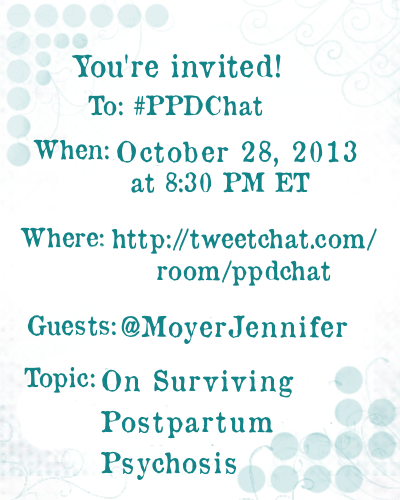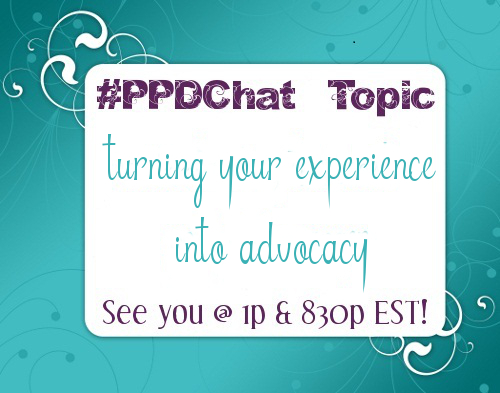With more news stories mentioning Postpartum Depression these days, it is becoming painfully obvious that reporters are scrambling to get their facts straight. Bless them for trying but sometimes, even with the best of intentions, they fall short. Like Karen Weintraub’s article “When the ‘baby blues’ are something more” at the Boston Globe on October 21, 2013.
Karen defends herself in the comments (all two of them at time of writing) about the term “baby blues” by saying that in her researching for this piece, she discovered there is such a thing as baby blues:

Kudos to Ms. Weintraub for doing enough research to realize that baby blues ARE distinct from depression.
BUT.
There are a multitude of omissions and errors within the article as it stands right now. Let’s go through them:
Ms. Weintraub breaks the Perinatal Mood & Anxiety Disorder experience into only three groups:
- Baby Blues
- Postpartum Depression
- Postpartum Psychosis
Immediately, sirens sound. Particularly because the case study, a Nicole Caligiuri, a first time mother, states she felt “angry and anxious” all the time. While anger/irritability is a sign of depression, anxiety combined with anger is typically (in my non-professional opinion) more closely related to an anxiety disorder. Ms. Caligiuri, however, was diagnosed with Postpartum Depression.
By ignoring the additional facets of the PMAD spectrum, Ms. Weintraub does a severe disservice to those mothers who may be suffering from Postpartum Anxiety, Postpartum Post-traumatic Stress Disorder, or Postpartum OCD.
Weintraub states that 50-85% of new mothers experience baby blues, 14% experience postpartum depression, and a “fraction of 1 percent of new moms” experience Postpartum Psychosis. If you go by those numbers (at the higher levels), nearly 100% of all new mothers experience one of these three phenomena and none experience Postpartum Anxiety, Postpartum Post-traumatic Stress Disorder, or Postpartum OCD.
According to Postpartum Support International’s Get the Facts page:
- Approximately 6% of pregnant women and 10% of postpartum women develop anxiety. Sometimes they experience anxiety alone, and sometimes they experience it in addition to depression.
- Postpartum Obsessive-Compulsive Disorder (OCD) is the most misunderstood and misdiagnosed of the perinatal disorders. It is estimated that as many as 3-5% of new mothers will experience these symptoms.
- Approximately 1-6% of women experience postpartum post-traumatic stress disorder (PTSD) following childbirth.
But in Weintraub’s scenario, there isn’t room for the nearly 20-27% of women who develop these particular Perinatal Mood & Anxiety Disorders. As a survivor of Postpartum OCD, I find this troubling. Particularly because OCD can scare a new mother into thinking she is experiencing a form of Psychosis due to the horrific intrusive thoughts.
As I have mentioned multiple times, it is beyond important to differentiate the varying aspects of a Perinatal Mood & Anxiety Disorder. Why? Because when you lump Postpartum Psychosis sensationalism in with Postpartum Depression, things get murky. You scare new mothers who may be a bit depressed into thinking if they go get help, they will be thought of as potential criminals and have their babes ripped from their arms the instant they admit to feeling anything less than happy.
An additional issue with this article is the strong focus on early motherhood. The logic of this focus is evidenced by the study on which it is centered but a quick mention that PMAD can persist beyond early motherhood would have been a quick fix for this bias.
Why is it important to emphasize that PMAD onset can extend beyond early motherhood?
Often, many mothers do not realize they have issues until they are well into the 6th month or more. I have had mothers contact me at almost a year postpartum to share that they think something has been deeply wrong since the birth of their child but they did not recognize it until now. Many Perinatal Mood & Anxiety Disorders crop up within the first 2-3 months, often immediately after the period of baby blues, but some mothers do not recognize them or even get hit with them until much later. PMAD’s can crop up within the first 12 months after birth and even then, may not be recognized until much later. But this information is not mentioned anywhere in the article nor are we ever told at what point Ms. Caligiuri sought help.
I deeply appreciate Ms. Weintraub’s effort to reach out to Dr. Katherine Wisner and Dr. Michael O’Hara, respected experts in the research field of Perinatal Mood & Anxiety Disorders, however, I wish she (or her editor) had taken the time to allow this article to be a bit more clear regarding the wide scope of Perinatal Mood & Anxiety Disorders. I also wish a side bar had been included to resources for women and families who are struggling with these issues, particularly given that Ms. Weintraub included this quote from Dr. O’Hara:
Social support is probably the most important thing to provide a new mother, who is at a particularly fragile point in life, said Michael O’Hara, a professor of psychology at the University of Iowa, who has been researching and treating postpartum depression for three decades.
Postpartum Support International will connect new mothers with social support. Also, specifically in Hadley, Massachusetts, there is Mother Woman, a fabulous organization who is making fantastic strides toward improving access to support and care for struggling women & families. Advocates in the trenches, such as the volunteers with PSI and Mother Woman, recognize how important it is to have peers support each other so they do not feel all alone in the dark. It is an oversight that neither of these organizations are mentioned anywhere in Ms. Weintraub’s piece.
Overall, Ms. Weintraub, despite making a few blunders, seems to handle the issue at hand with a respectable grace. The study at the heart of the article focuses on the development of depression in children born to mothers who struggled with depression but Ms. Weintraub is fabulous in her handling of this issue, particularly with this paragraph:
But parents shouldn’t feel like they’ve ruined their child’s life if they go through a period of depression, Pearson said. The increased risk of depression in their children is small. Overall, 7 percent of teens are depressed, compared with 11 percent of teens whose mothers were depressed early in their children’s lives.
She side-steps the potential onslaught of guilt and gracefully allows parents to breathe a sigh of relief by including this information from the study’s co-author.
As I stated in the opening, coverage of Perinatal Mood & Anxiety Disorders is greatly improving. But we still have a long way to go to get to fully informed reporting. For the most part, Ms. Weintraub’s article is generally free of sensationalism, includes quotes from respected experts, and manages to allay any potential guilt a new mother with a PMAD may feel in reading it. However, it is still just a few small adjustments away from being truly spectacular and informative.

 Jennifer’s mission is to bring hope and inspiration to individuals and families facing mental health challenges. She is a mental health advocate. She overcame postpartum psychosis. She is a writer and speaker on mental health issues striving to increase the awareness, education, prevention and treatment of postpartum psychosis and other mental health issues related to childbearing as well as mental health, in general. Visit her website here.
Jennifer’s mission is to bring hope and inspiration to individuals and families facing mental health challenges. She is a mental health advocate. She overcame postpartum psychosis. She is a writer and speaker on mental health issues striving to increase the awareness, education, prevention and treatment of postpartum psychosis and other mental health issues related to childbearing as well as mental health, in general. Visit her website here.



